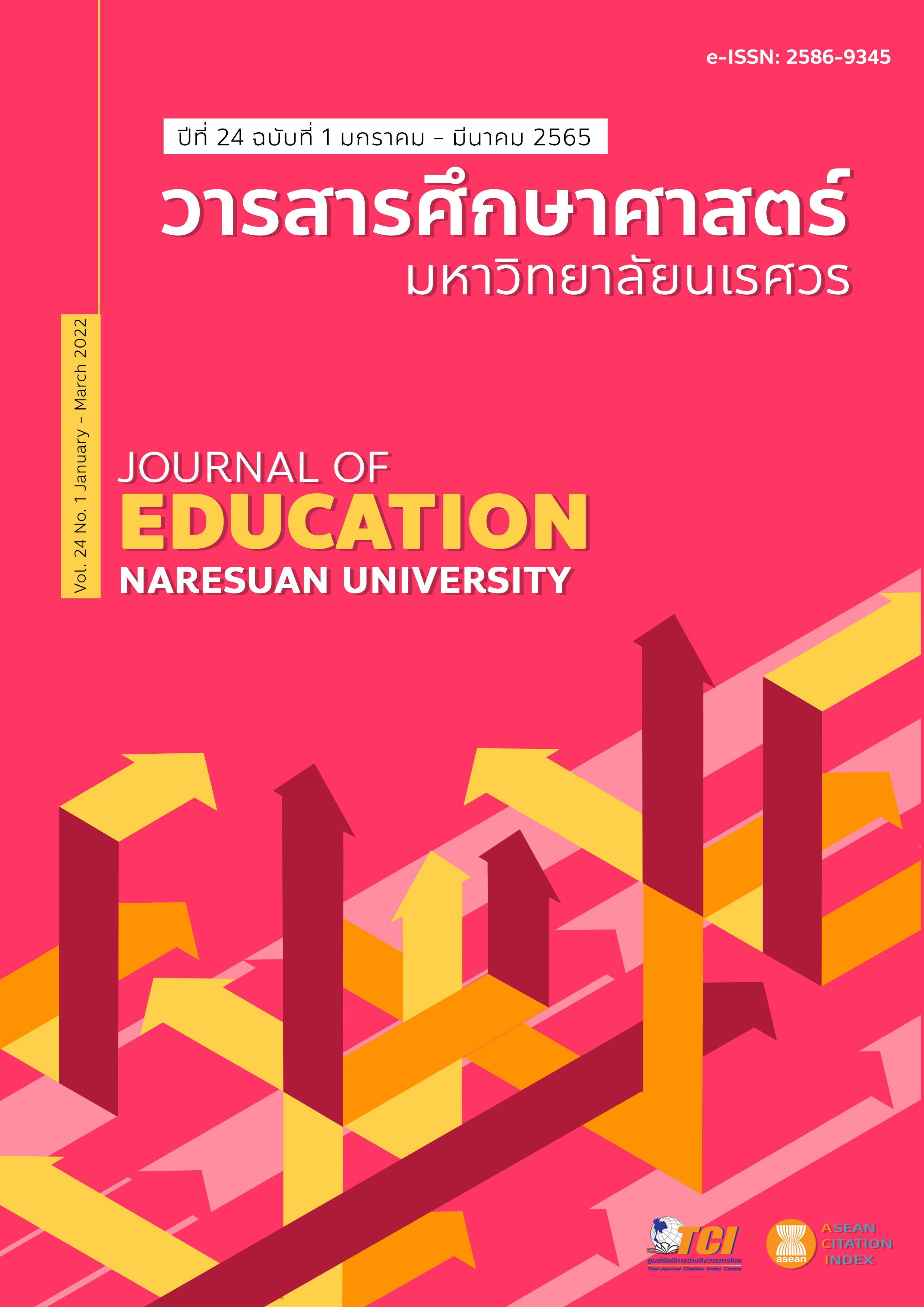USING PROBLEM-BASED LEARNING APPROACH TO ENHANCE STUDENT TEACHERS’ LESSON DESIGN ABILITY FOR 21ST CENTURY การจัดการเรียนรู้โดยใช้ปัญหาเป็นฐานเพื่อส่งเสริมความสามารถในการออกแบบการจัดการเรียนรู้ในศตวรรษที่ 21 ของนักศึกษา
Main Article Content
Abstract
The purposes of this research were to study the effects of problem-based learning approach in two aspects; the effect of the approach on the improvement of student teachers’ lesson design ability for 21st century, and the effect on students’ satisfaction. Participants in this research were 47 mathematics student. Research instruments consisted of lesson plans, assessment of the ability to design learning management plans adopted from Sahin (2009) Instructional Design Principles for 21st Century Learning Skills framework, observation form and questionnaires. The descriptive statistics, S.D., Average and Percent, were used to analyze the data. The results were as follows; 1) After finish activity in each action cycle found students have more ability in design learning activity for 21st century and they have ability score in high level ( = 15.50, S.D. = 1.31) 2) the overall satisfaction level of problem-based learning approach was at the highest level (
= 4.68, S.D. = 0.33).
Article Details

This work is licensed under a Creative Commons Attribution-NonCommercial-NoDerivatives 4.0 International License.
The owner of the article does not copy or violate any of its copyright. If any copyright infringement occurs or prosecution, in any case, the Editorial Board is not involved in all the rights to the owner of the article to be performed.
References
Ariya, K., Kaewurai, W., & Chaisanit, P. (2016). A development of an instructional model based-on differentiated instruction approach to enhance the ability of learning management design of 21st century for student teachers, Rajabhat University. Lampang Rajabhat University Journal, 5(2), 1-17. [in Thai]
Borrows, H. S. (1996). Problem-Based Learning in Medicine and Beyod: A Brief Overview, In L. Wilkerson and W.H. Gijselaers (eds.), New Directions for Teaching and Learning Series, No. 68 (pp. 3-11). San Francisco: Jossey-Bass.
Delisle, R. (1997). How to use problem-based learning in the classroom. Alexandria, VA: Association for Supervision and Curriculum Development.
Drăghicescu, L. M., Petrescu, A. M., Cristea, G. C., Gorghiu, L. M., & Gorghiu, G. (2014). Application of problem-based learning strategy in science lessons–Examples of good practice. Procedia-Social and Behavioral Sciences, 149, 297-301.
Hmelo-Silver, C. E. (2004). Problem-based learning: What and how do students learn? Educational Psychology Review, 16, 235-266.
Jones, R. W. (2006). Problem-based learning: Description, advantages, disadvantages, scenarios and facilitation. Anaesthesia and Intensive Care, 34(4), 485-488.
Klomim, K. (2017). How to learning problem based learning: coursed design and development coursed for students teachers. Journal of graduate studies Valayu Alongkorn Rajabhat University, 11(2), 179-192. [in Thai]
Mapudh, C. (2017). Teacher competency and professional standards in accordance with the changing conditions of Thai society. In Office of the Education Council. System and model of teacher development suitable for Thai society and internationalization (pp. 3-27). Bangkok: Prikwan Graphic. [in Thai]
Nelson, D. (2013). Action Research: An Appropriate Research Paradigm for Practitioners. Language in India, 13(10), 183-196.
Office of the Education Council. (2013). Teacher policy. Bangkok: Office of the Education Council. [in Thai]
Panghom, R., Srisanyong, S., & Teeravanitrakul, S. (2016). Construction of learning packages using a problem-based approach relating geographical phenomena for matthayomsuksa IV students. Journal of Education Naresuan University, 18(4). 278-293. [in Thai]
Panich, V. (2012). How to create learning for students in the 21st century. Bangkok: Sodsri-Saritwong Foundation. [in Thai]
Rodklai, K. (2017). System and model of teacher development suitable for Thai society and internationalization. Bangkok: Prikwan Graphic. [in Thai]
Sahin, M. C. (2009). Instructional design principles for 21st century learning skills. Procedia Social and Behavioral Sciences, 1, 1464–1468.
Savery, J. R. (2006). Overview of Problem-based Learning: Definitions and Distinctions. Interdisciplinary Journal of Problem-Based Learning, 1(1), 9-20.
Siridhrungsri, P. (2014). Improve the quality of teachers in the 21st century. In Learning Progress to Change Thailand meeting (pp. 8-10). Bangkok: IMPACT Arena. [in Thai]


